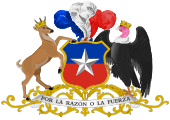
The Political Constitution of the Republic of Chile of 1980 is the fundamental law in force in Chile. It was approved and promulgated under the military dictatorship headed by Augusto Pinochet, being ratified by the Chilean citizenry through a referendum on September 11, 1980, although being held under restrictions and without electoral registers. While 69% of the population was reported to have voted yes, the vote was questioned by hundreds of denunciations of irregularities and fraud. The constitutional text took effect, in a transitory regime, on March 11, 1981, and then entered into full force on March 11, 1990, with the return to electoral democracy. It was amended for the first time in 1989, and afterward in 1991, 1994, 1997, each year from 1999 to 2001, 2003, each year from 2007 to 2015, and each year from 2017 to 2021, with the last three amendments concerning the constituent process of 2020–2022. In September 2005, under Ricardo Lagos's presidency, a large amendment of the Constitution was approved by parliamentarians, removing from the text some of the less democratic dispositions coming from Pinochet's regime, such as senators-for-life and appointed senators, as well as the armed forces' warranty of the democratic regime.

The Christian Democratic Party is a Christian democratic political party in Chile. There have been three Christian Democrat presidents in the past, Eduardo Frei Ruiz-Tagle, Patricio Aylwin, and Eduardo Frei Montalva.
United States intervention in Chilean politics started during the War of Chilean Independence (1812–1826). The influence of United States in both the economic and the political arenas of Chile has since gradually increased over the last two centuries, and continues to be significant.
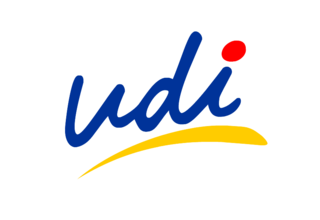
The Independent Democratic Union is a conservative and right-wing political party in Chile, founded in 1983. Its founder was the lawyer, politician and law professor Jaime Guzmán, a civilian allied with Augusto Pinochet. Guzmán was a senator from 1990 until his murder by communist guerrillas on April 1, 1991.


The 1973 Chilean coup d'état was a military overthrow of the Popular Unity government in Chile led by the democratic socialist Salvador Allende as president of Chile. Allende, who has been described as the first Marxist to be democratically elected president in a Latin American liberal democracy, faced significant social unrest, political tension with the opposition-controlled National Congress of Chile, and economic warfare ordered by United States president Richard Nixon. On 11 September 1973, a group of military officers, led by General Augusto Pinochet, seized power in a coup, ending civilian rule. In 2000, the CIA admitted its role in the 1970 kidnapping of René Schneider, who had refused to use the army to stop Allende's inauguration. 2023 declassified documents showed that Nixon, Henry Kissinger, and the United States government, which had branded Allende as a dangerous communist, were aware of the coup and its plans to overthrow Allende's democratically-elected government.

The National Congress of Chile is the legislative branch of the government of the Republic of Chile.

An authoritarian military dictatorship ruled Chile for seventeen years, between 11 September 1973 and 11 March 1990. The dictatorship was established after the democratically elected socialist government of Salvador Allende was overthrown in a coup d'état backed by the United States on 11 September 1973. During this time, the country was ruled by a military junta headed by General Augusto Pinochet. The military used the breakdown of democracy and the economic crisis that took place during Allende's presidency to justify its seizure of power. The dictatorship presented its mission as a "national reconstruction". The coup was the result of multiple forces, including pressure from conservative groups, certain political parties, union strikes and other domestic unrest, as well as international factors.

Miguel Juan Sebastián Piñera Echenique is a Chilean billionaire businessman and politician who served as president of Chile from 2010 to 2014 and again from 2018 to 2022.

National Renewal is a liberal conservative political party in Chile. It is a member of Chile Vamos, a center-right to right-wing coalition. Sebastián Piñera, the former President of Chile, is a member of the party.

Juan Salvador Guzmán Tapia was a Chilean judge. He was the first Chilean judge to lead investigations and prosecute Augusto Pinochet for violations of human rights during his dictatorship between 1973 and 1990. As a special prosecutor, he used novel legal strategies to hold Pinochet and members of his military regime accountable for the killings and human rights violations during this period.

Ricardo Froilán Lagos Escobar is a Chilean lawyer, economist and social-democratic politician who served as president of Chile from 2000 to 2006. During the 1980s he was a well-known opponent of the Chilean military dictatorship and astounded contemporaries in 1988 by openly denouncing dictator Augusto Pinochet on live television. He served as Minister of Education from 1990 to 1992 and Minister of Public Works from 1994 to 1998 under president Eduardo Frei Ruiz-Tagle before narrowly winning the 1999-2000 presidential election in a runoff against Independent Democrat Union (UDI) candidate Joaquín Lavín. Lagos was the third president from the center-left Coalition of Parties for Democracy to have governed Chile since 1990. He was succeeded on 11 March 2006 by Socialist Michelle Bachelet, from the same coalition. From 2007 to 2010 he served as a Special Envoy on Climate Change for the United Nations Secretary-General Ban Ki-moon. Lagos made an unsuccessful bid to run for president in the 2017 Chilean general election.

A constitutional referendum was held in Chile on 11 September 1980. The proposed new constitution would replace the 1925 constitution, and was approved by over two-thirds of voters.
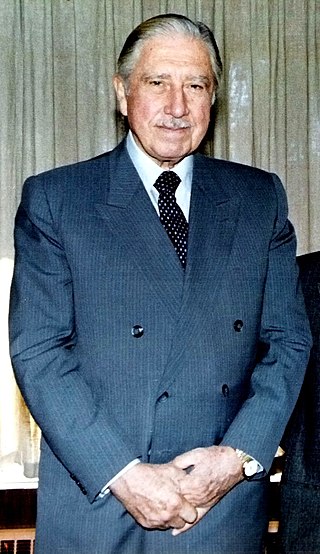
General Augusto Pinochet was indicted for human rights violations committed in his native Chile by Spanish magistrate Baltasar Garzón on 10 October 1998. He was arrested in London six days later and held on house arrest for a year and a half before being released by the British government in March 2000. Authorised to return to Chile, Pinochet was subsequently indicted by judge Juan Guzmán Tapia and charged with several crimes. He died on 10 December 2006 without having been convicted. His arrest in London made the front pages of newspapers worldwide; not only did it involve the head of the military dictatorship that ruled Chile between 1973 and 1990, it marked the first time judges had applied the principle of universal jurisdiction, declaring themselves competent to judge crimes committed in a country by former heads of state, despite the existence of local amnesty laws.

Carlos Humberto Caszely Garrido is a Chilean former footballer, nicknamed "Rey del metro cuadrado", who played as a forward.

On 11 March 1990, Chile transitioned to a democracy, ending the military regime led by General Augusto Pinochet. This transition lasted 15 years. Unlike most democratic transitions led by either the elite or the people, this democratic transition process is known as an intermediate transition - a transition involving both the regime and the civil society. Throughout the transition, as the regime increased repressive violence, it simultaneously supported liberalization - progressively strengthening democratic institutions and gradually weakening that of the military.
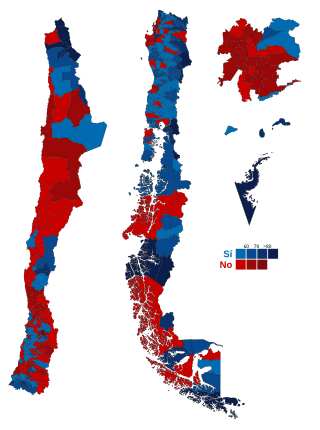
A referendum on whether Augusto Pinochet, the head of a military dictatorship, should become president for eight years under resumed civilian rule was held in Chile on October 5, 1988. The "No" side won with 56% of the vote, marking the end of Pinochet's 16-and-a-half-year rule. Democratic elections were held in 1989, leading to the establishment of a new government in 1990.
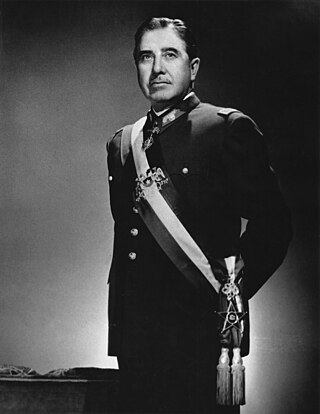
Augusto José Ramón Pinochet Ugarte was a Chilean general and dictator who ruled Chile from 1973 to 1990, first as the leader of the Military Junta of Chile from 1973 to 1981, being declared President of the Republic by the junta in 1974 and becoming the de facto dictator of Chile, and from 1981 to 1990 as de jure president after a new constitution, which confirmed him in the office, was approved by a referendum in 1980. His rule remains the longest of any Chilean leader in history.
The following lists events that happened during 1978 in Chile.

Pinochetism is an authoritarian and personalistic political ideology rooted in the military dictatorship led in Chile between 1973 and 1990 by Augusto Pinochet. Variously described as right-wing, far-right, and semi-fascist, Pinochetism is characterised by its anti-communism, conservatism, militarism, and nationalism. Under Pinochet, Chile's economy was placed under the control of a group of Chilean economists known collectively as the Chicago Boys, whose liberalising policies have been described by some as neoliberal. Former and current supporters of the dictatorship are known as pinochetistas.

